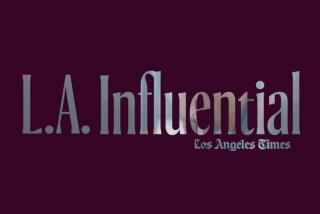AMERICA’S WORLD ROLE: DIVIDED WE STAND : How the Survey Was Done
- Share via
The Times Mirror Influential Americans Survey is based on telephone interviews with 649 Americans recognized as holding power, prestige or influence in at least one of nine fields. Quotas were set for the number of completed interviews from each field.
While efforts were made to make the sample as representative as possible, respondents were selected systematically. The groups, number of people interviewed and how they were picked:
* Media (79)--Chosen from a list of editors, Washington bureau chiefs, columnists, television anchors, executive producers and radio news directors.
* Business and finance (69)--Drawn from the Fortune 1,000 list of industrial and service companies.
* Entertainment and Culture (79)--A random sample of fine artists, writers/authors, critics and musicians from Who’s Who in America.
* Foreign Affairs (69)--Selected randomly from the membership roster of the Council on Foreign Relations.
* Defense (68)--Selected randomly from among members of the International Institute for Strategic Studies.
* State and local government (69)--Chosen from a sample including all governors and mayors of cities with a population of 80,000 or more.
* Academia (78)--The heads of various influential think tanks listed in the Capitol Source were selected, as well as officers of the most competitive schools in the United States (as identified in a college directory).
* Religion (47)--U.S. leaders of Protestant, Roman Catholic, Jewish and Muslim religious organizations were selected along with top people at the National Council of Churches.
* Science & Engineering (91)--Selected from a random sample of National Academy of Sciences and National Academy of Engineering members.
Interviewing occurred between July 7 and Aug. 26, 1993.
Demographically, survey respondents are mostly male (89%), white (95%) and highly educated (93% hold university degrees, including 29% with master’s and 41% with doctorates). Democrats outnumbered Republicans two to one, with more than one-third describing themselves as independent.
The parallel public survey is based on telephone interviews by Princeton Survey Research Associates among a nationwide sample of 2,000 adults Sept. 9-15, 1993. The error attributable to sampling and other effects is believed to be plus or minus two percentage points. A follow-up public poll was conducted among a nationwide sample of 1,200 adults Oct. 21-24, 1993.
*
The editor of this special edition was Dan Fisher; news editor, Jane Engle; art director, Matt Moody; photo assignment editors, Jayne Kamin and Robert Durell; copy editor, Craig Fisher.
More to Read
Sign up for Essential California
The most important California stories and recommendations in your inbox every morning.
You may occasionally receive promotional content from the Los Angeles Times.









